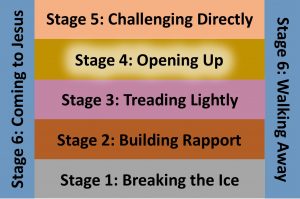 When dealing with Jehovah’s Witnesses, asking questions almost always works better than making declarations. That’s because they see themselves as the teachers and you as the student.
When dealing with Jehovah’s Witnesses, asking questions almost always works better than making declarations. That’s because they see themselves as the teachers and you as the student.
But there comes a time in your relationship where you will need to put some of your cards on the table and open up about what you believe even though you know that will cause friction between you and the Witnesses.
It’s not always easy to know when that moment has arrived. If you move too quickly or too boldly, the Witnesses may simply pack up their book bags and leave.
Here is some advice about how to make the transition:
1. When you make statements about what you believe, follow them up with questions that will keep the dialogue going.
Although questions almost always work better with Jehovah’s Witnesses than making statements, sometimes in order to get through to them you have to tell them point blank what you believe and why.
The problem is that if you aren’t careful you will come across as trying to take over the role of teacher and that will poison the relationship.
The best way to avoid this is to follow up with a question that invites them to give you their feedback.
Have them read the Bible passage aloud and then say something like this, “If it’s all right with you, I’d like to explain what I think this passage means and then I’ll listen to your response. Is that okay?” Of course, they will say yes.
Give them your understanding of the passage and then follow immediately with an inquiry, such as:
- “I’d like to get your take on that. What do you think?”
- “Please help me understand where you think I’m off track.”
- “That’s how I understand the passage. Do you see why I would think that?”
The last question is a good diagnostic. You aren’t asking them if they agree with you. You’re just asking if they understand why you would believe what you do.
Some Witnesses will see your point and say, “Well, yes, I can see how you might think that but…” Others will be hard as nails and won’t even concede that much.
Remember to watch the facial expressions and body language of the Witness who is not doing the talking. One time, the Witness who took the lead wouldn’t budge an inch, but I could see that his partner was actually pondering what I had said, and I was able to get through to him. Eventually, he left the Watchtower and came to saving faith in Christ
2. Continue to focus on reading the Bible in context and discussing one topic at a time.
The deeper you get into discussing Bible topics you disagree with the Witnesses about, and the closer you come to getting them to doubt what the Watchtower teaches them, the stronger will be their inclination to jump to a topic they feel more comfortable with. Don’t let them do this. Agree to discuss the new topic another day, but stick to the topic at hand.
3. Initially avoid the most controversial Bible topics.
Start with less controversial matters and build up to the point where you have enough rapport with them that they will keep the discussions going even when you disagree on hot button issues.
When dealing with Jehovah’s Witnesses, the Bible issues that will generate the most friction are
- The deity of Christ
- The Trinity
- Hell
Save those topics for the end of this stage and make sure they are ready before you get into them. You might say something like this: “I know this is a very controversial issue. I’m willing to discuss it but first I want to make sure that we are at a point in our relationship where we can discuss our differences civilly and rationally without getting overwhelmed by the strong emotions that these topics can generate.”
Even if they assure you that there’s no problem, proceed very cautiously and be willing to back off rather than risking the immediate end of any further discussions.
4. Stick to discussing the Bible itself.
At this stage, completely avoid discussing the following (even if you have documentary evidence):
- Watchtower false prophecies
- Watchtower doctrinal flip-flops
- Watchtower scandals
Why? Because if you move into this too quickly, you will come across as ambushing the Witnesses. There may come a time in your witnessing relationship where addressing one of these topics can be very effective. However, if you present this evidence too soon or in the wrong way, all you will achieve is convincing the Witnesses that you are persecuting them for being “in the truth.”
Compare this moment to a situation that has nothing to do with Jehovah’s Witnesses or religion. Suppose you know someone who really ought to be told some unpleasant information but revealing it would likely make them angry and defensive. It might even ruin whatever relationship you have with them.
In that event, you wouldn’t just blurt it out. Rather, you’d would proceed very cautiously. You’d first build your relationship to the point where they knew that you truly cared about them and had their best interests at heart. Even then, you’d check out their reaction on lesser issues and back off quickly if things didn’t go well. You’d wait until the time was right.
Your turn:
When expressing your opinion to Jehovah’s Witnesses, it’s important to do so in a way that will get them to keep the dialogue going instead of tuning you out. Do you find the advice in this post helpful? What other suggestions do you have?
Share your thoughts in the comments.
Coming next: Stage 5 of a Witnessing Relationship: Challenging Directly

Leave a Reply
Be the First to Comment!